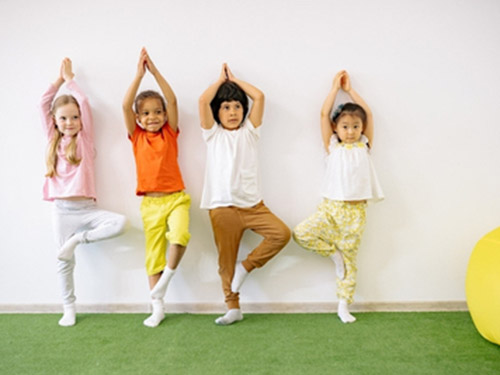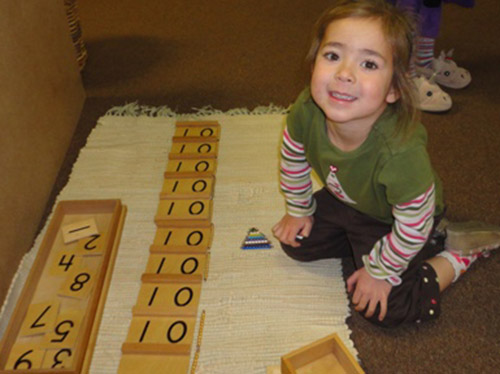
In the years leading up to elementary school, children are growing rapidly, physically, mentally, and emotionally. They are learning new things by interacting with the world around them and developing a sense of who they are and where they fit into it all. When children reach elementary school, many big changes take place, changes that can either help or hurt the image of self the child had been crafting.
How will they acclimate to their new surroundings? How will they do in their studies? How well will they get along with their peers? These are just a few of the concerns parents have as they watch their children transition into elementary schooling in the Montessori environment. Parents, guardians, and other adult role models can help to boost confidence in elementary-age children by supporting feelings of competence, independence, and value.
The following self-confidence activities present an engaging way to build confidence and self-esteem in elementary school children. By incorporating these activities that teach social skills, problem-solving skills, and assurance, you can help your child prepare to navigate the new issues elementary school brings.
Letter to Yourself
One simple and effective activity practiced in elementary programs, Montessori and traditional education alike, is asking children to pen a letter to themselves. Because self-understanding and self-acceptance are so crucial to developing positive self-esteem, the opportunity to reflect on what makes one who they are is valuable to building these essential skills.
Have your student write a thank you letter to themselves, in which they write about the qualities they are happy to possess, the accomplishments they are proud of, and so on. Another option is to have students write a letter to their future selves about who they aim to be and what they would like to accomplish by the end of the school year.
Achievement Poster
Similar to a letter to self, creating an achievement poster or collage is a useful way of encouraging feelings of accomplishment and pride in your student. The activity begins with asking your Montessori elementary student to construct a list of all their victories or triumphs so far in their life. These victories could include anything from awards, athletic or academic achievements, or instances when they were considerate and helpful to others. Students can list goals they have reached, obstacles they have overcome, and times they have learned lessons through mistakes or missteps.
When students have listed their wins, next they will use them to create a collage of their achievements on a sheet of poster board. Using drawings, photos, and magazines, students can cut and paste images that represent all the great things they have accomplished. Once complete, hang the posters in a visible spot as a reminder of their many feats.
‘I Am’ Art
In the same vein, the ‘I Am’ art project promotes good feelings around how students conceptualize and define themselves. In this activity, you would ask your elementary student to draw an image of themselves or paste a photo in the middle of a sheet of paper or poster board. Students will then write roles that define them surrounding the photo, roles that could include anything from soccer player to sibling to a helper.
Following the picture and roles, students will then write praising characteristics that represent themselves. Later, encourage your student to share their creation with a friend or group, explaining how they feel each trait describes them. This activity not only helps students reflect on their identity and self-image but also allows them to acknowledge their positive qualities.
Affirmation Jar
Words of affirmation are terms that express love, gratitude, and regard for oneself or another person. These positive words and phrases are often used to uplift and encourage the favorable traits that already exist within us. For Montessori elementary school children who are in the process of growing their self-confidence, affirmations are beneficial statements to solidify feelings of worth and value.
Students can practice words of affirmation at home or in the classroom by creating an affirmation jar that they can pull from whenever they need a boost or reminder of how wonderful they are. Have your student write positive phrases on small pieces of paper, phrases such as “I am capable of anything I put my mind to,” or “I am loved and appreciated.” Next, fold up the phrases and put them in a jar. Pulling affirmations from the jar can be a daily routine or a mood-lifting treat for your elementary student, increasing their self-confidence day by day.
Learning New Skills
One of the simplest and surest methods of building confidence in childhood, and at any age, is learning a new skill, especially in an area of individual interest. Organic interest is important in this case, because when a student is not invested in the subject area or the skill they are practicing, they may begin to lose motivation to continue, which could ultimately hurt their confidence in the long run.
Some fun skills to introduce to your elementary student to encourage confidence in their abilities include cooking, working with technology, drawing, painting, and playing musical instruments. Because confidence grows from feelings of well-being, acceptance, and belief in your ability, skills, and experience, practicing those skills is beneficial to students’ overall confidence.
Regardless of the activity you choose to practice with your Montessori elementary student, self-confidence activities are extremely important when it comes to the development of the whole child. At the elementary school stage, children are beginning to learn how to get along with others, how to get along with themselves, and how to get along in the world. The more confident and able your student feels at this stage, the more likely they will continue being assured, competent, and empowered.
The Montessori Charter School of Flagstaff was the first school in Arizona to have its application for a charter approved by the Arizona State Board for Charter Schools. We offer an academic program that identifies and encourages each child’s individual social and emotional development. Visit our blog to learn more about our method or reach out today to begin your journey with The Montessori Charter School of Flagstaff.


